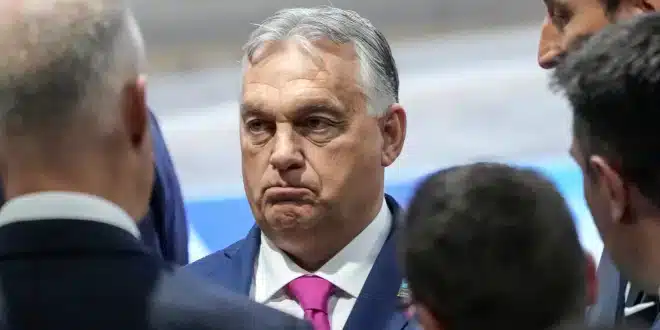Hungarian Prime Minister Viktor Orbán has pledged to “Make Europe Great Again” during Hungary’s six-month presidency of the European Union. In a surprising move last week, Orbán visited Ukraine for the first time since the Russian invasion, followed by unannounced trips to Russia and China to engage with two of the EU’s major adversaries.
Orbán, the EU’s longest-serving leader known for his close ties with former President Donald Trump and Russian President Vladimir Putin, completed a NATO summit in Washington on Thursday before heading to Trump’s Mar-a-Lago estate. He referred to his travels as a “peace mission” aimed at resolving the conflict between Russia and Ukraine.
Orbán shared a photo with Trump on social media, captioned: “We discussed ways to make peace. The good news of the day: he’s going to solve it!” Trump echoed this sentiment on his platform, posting: “Thank you Viktor. There must be PEACE, and quickly.”
However, Orbán’s recent meetings with Putin and Chinese President Xi Jinping have angered EU leaders, who are now trying to manage Hungary’s presidency over the next six months. Swedish Prime Minister Ulf Kristersson criticized Orbán for using the EU presidency for personal gain, saying, “As the president country, one must act as an honest broker.”
Political analyst Péter Krekó described Hungary’s presidency as “troll diplomacy,” suggesting that Orbán’s actions will further isolate him from Western partners who see him as undermining EU and NATO efforts to support Ukraine. Krekó stated, “He’s marginalizing himself more and more in EU politics, and it’s a foreign policy of self-destruction.”
Orbán’s close relationship with Putin has long troubled his Western allies, especially after Russia’s full-scale invasion of Ukraine in 2022. Additionally, Orbán has lobbied for increased Chinese investment and a more China-friendly economic policy, diverging from the stance of most EU countries.
Orbán’s unannounced meetings with Putin, Xi, and Trump have sparked significant backlash from European capitals, with some governments considering boycotting or limiting participation in upcoming informal meetings in Budapest related to the rotating presidency. An anonymous EU diplomat noted that Orbán’s actions have heightened tensions and created ambiguity about his role.
Hungary’s EU affairs minister, János Bóka, downplayed reports of boycotts, claiming no official initiatives to undermine Hungary’s presidency. However, Kristersson confirmed that ministers from Sweden, Finland, and the Baltic countries would not participate in informal summer meetings.
The EU’s patience with Orbán is wearing thin. He has consistently obstructed EU efforts to assist Kyiv and impose sanctions on Moscow. The EU has also withheld over $20 billion in funds to Hungary over allegations of democratic and corruption violations.
Krekó argued that Orbán’s recent secret meetings with adversaries show he no longer tries to appear as a loyal ally and is increasingly a disruptive force within the EU and NATO. His meeting with Trump, a known NATO critic, is another example of his “troll diplomacy.”
White House national security adviser Jake Sullivan expressed concern over the Trump-Orbán meeting, emphasizing that any initiatives regarding Ukraine should involve Ukraine’s consent and support.
Orbán has suggested that his controversial foreign policy stems from Hungary’s relatively modest global influence, arguing that a radical position is necessary for an independent foreign policy. However, Krekó believes Orbán’s actions are more about elevating his political standing rather than changing global geopolitics.
“It’s about this selfish game to elevate his own weight and political position in the eyes of the Hungarian public and the global public,” Krekó concluded.


